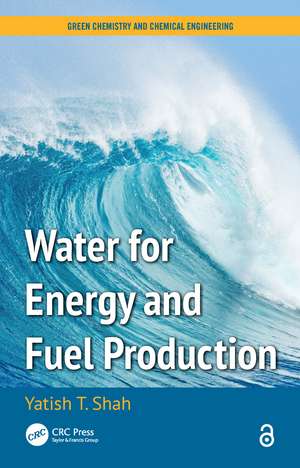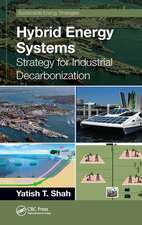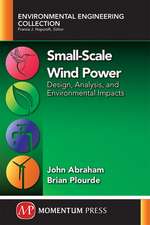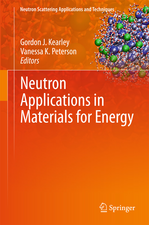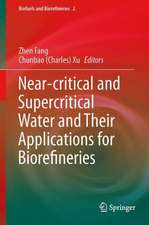Water for Energy and Fuel Production: Green Chemistry and Chemical Engineering
Autor Yatish T. Shahen Limba Engleză Paperback – 31 mar 2017
Water for Energy and Fuel Production explores the many roles of water in the energy and fuel industry. The text not only discusses water’s use as a direct source of energy and fuel—such as hydrogen from water dissociation, methane from water-based clathrate molecules, hydroelectric dams, and hydrokinetic energy from tidal waves, off-shore undercurrents, and inland waterways—but also:
- Describes water’s benign application in the production of oil, gas, coal, uranium, biomass, and other raw fuels, and as an energy carrier in the form of hot water and steam
- Examines water’s role as a reactant, reaction medium, and catalyst—as well as steam’s role as a reactant—for the conversion of raw fuels to synthetic fuels
- Explains how supercritical water can be used to convert fossil- and bio-based feedstock to synthetic fuels in the presence and absence of a catalyst
| Toate formatele și edițiile | Preț | Express |
|---|---|---|
| Paperback (1) | 713.39 lei 6-8 săpt. | |
| CRC Press – 31 mar 2017 | 713.39 lei 6-8 săpt. | |
| Hardback (1) | 1409.74 lei 6-8 săpt. | |
| CRC Press – 16 mai 2014 | 1409.74 lei 6-8 săpt. |
Din seria Green Chemistry and Chemical Engineering
- 18%
 Preț: 849.40 lei
Preț: 849.40 lei - 18%
 Preț: 1336.46 lei
Preț: 1336.46 lei - 25%
 Preț: 1430.10 lei
Preț: 1430.10 lei - 15%
 Preț: 651.72 lei
Preț: 651.72 lei - 18%
 Preț: 700.75 lei
Preț: 700.75 lei - 25%
 Preț: 1020.98 lei
Preț: 1020.98 lei - 9%
 Preț: 1347.50 lei
Preț: 1347.50 lei - 15%
 Preț: 508.10 lei
Preț: 508.10 lei - 26%
 Preț: 765.47 lei
Preț: 765.47 lei - 14%
 Preț: 1594.59 lei
Preț: 1594.59 lei - 25%
 Preț: 496.94 lei
Preț: 496.94 lei - 18%
 Preț: 1590.61 lei
Preț: 1590.61 lei - 26%
 Preț: 1019.32 lei
Preț: 1019.32 lei - 25%
 Preț: 881.30 lei
Preț: 881.30 lei - 15%
 Preț: 459.74 lei
Preț: 459.74 lei - 18%
 Preț: 700.75 lei
Preț: 700.75 lei - 18%
 Preț: 700.75 lei
Preț: 700.75 lei - 15%
 Preț: 585.27 lei
Preț: 585.27 lei - 25%
 Preț: 524.78 lei
Preț: 524.78 lei -
 Preț: 463.30 lei
Preț: 463.30 lei - 15%
 Preț: 533.03 lei
Preț: 533.03 lei - 22%
 Preț: 370.25 lei
Preț: 370.25 lei - 18%
 Preț: 905.11 lei
Preț: 905.11 lei - 18%
 Preț: 700.75 lei
Preț: 700.75 lei - 18%
 Preț: 1319.09 lei
Preț: 1319.09 lei - 18%
 Preț: 788.77 lei
Preț: 788.77 lei - 26%
 Preț: 1101.47 lei
Preț: 1101.47 lei
Preț: 713.39 lei
Preț vechi: 869.99 lei
-18% Nou
Puncte Express: 1070
Preț estimativ în valută:
136.52€ • 141.67$ • 114.11£
136.52€ • 141.67$ • 114.11£
Carte tipărită la comandă
Livrare economică 15-29 martie
Preluare comenzi: 021 569.72.76
Specificații
ISBN-13: 9781138076068
ISBN-10: 1138076066
Pagini: 440
Ilustrații: Approx. 225 equations; 23 Tables, black and white; 67 Illustrations, black and white
Dimensiuni: 156 x 234 x 28 mm
Greutate: 0.82 kg
Ediția:1
Editura: CRC Press
Colecția CRC Press
Seria Green Chemistry and Chemical Engineering
ISBN-10: 1138076066
Pagini: 440
Ilustrații: Approx. 225 equations; 23 Tables, black and white; 67 Illustrations, black and white
Dimensiuni: 156 x 234 x 28 mm
Greutate: 0.82 kg
Ediția:1
Editura: CRC Press
Colecția CRC Press
Seria Green Chemistry and Chemical Engineering
Cuprins
Introduction. Role of Water in Recovery and Production of Raw Fuels. Energy Recovery by Benign Hydrothermal Processes (ERP). Steam Gasification and Reforming Technologies. Hydrothermal Processes in Subcritical Water. Aqueous Phase Reforming and Bioforming Process. Biofine Hydrolysis Process and Derivative Product Upgrading Technologies. Anaerobic Digestion of Aqueous Waste for Methane and Hydrogen. Hydrolysis and Fermentation Technologies for Alcohols. Fuel Production by Supercritical Water. Water Dissociation Technologies for Hydrogen. Methane from Gas Hydrates. Power and Energy Directly from Water.
Notă biografică
Yatish T. Shah received his BS from University of Michigan, Ann Arbor, USA and MS and Sc.D from Massachusetts Institute of Technology, Cambridge, USA. During his 40+ years of experience, he has served as chemical and petroleum engineering department chairman, dean of engineering, chief research officer, provost, visiting scholar, and visiting professor at ten different institutions. Currently he is professor of engineering at Norfolk State University, Virginia, USA. He is also an active consultant to numerous organizations in the energy sector. He has authored four books and over 250 reviews and refereed technical publications in the areas of energy, environmental, and reaction engineering.
Recenzii
"This book is a first of its kind where one can refer to for the roles of water in fossil (conventional and unconventional), nuclear, and renewable energy sectors. It not only covers the use of water as a cooling or heating career fluid, but also as a reactant and reaction medium in different energy conversion processes."
—Sandeep Kumar, Old Dominion University, Norfolk, Virginia, USA
"This book provides encyclopedic coverage of the role of water in all aspects of energy production. This allows readers to gain general knowledge of a very wide range of topics, and the extensive references allow them to dig deeper when necessary. The book should prove valuable to engineers and scientists working in water and energy supply. … [It] is a valuable addition to the literature."
—Howard G. McIlvried, III, Gulf Research & Development Co., Pittsburgh, Pennsylvania, USA (Retired)
"This monograph gives comprehensive coverage of the use of water as a solvent, reactant, and energy carrier for producing energy, chemicals, and fuels. It covers both the traditional technologies as well as the technologies that are likely to be important in the years to come. Considering that water is becoming a scarce commodity in several countries, it will be a timely and welcome addition to the books in the field of green engineering … [as] it conveys to the reader the importance of water in sustainable development."
—Deepak Kunzru, Indian Institute of Technology, Kanpur
"The book provides a vibrant platform for students, researchers, entrepreneurs, and technologists to understand and learn more about the role of water in energy and fuel production in sustaining the ecosystem. The book focuses on promoting the concept of green and clean technology using chemistry and chemical engineering practices to reduce or eliminate the use and/or generation of potentially hazardous materials...[It] clearly overviews the methodologies for harnessing water energy for competing their market share."
--Sanjeev S Katti, D Parvatalu, and Jyoti Verma, ONGC Energy Center, India
—Sandeep Kumar, Old Dominion University, Norfolk, Virginia, USA
"This book provides encyclopedic coverage of the role of water in all aspects of energy production. This allows readers to gain general knowledge of a very wide range of topics, and the extensive references allow them to dig deeper when necessary. The book should prove valuable to engineers and scientists working in water and energy supply. … [It] is a valuable addition to the literature."
—Howard G. McIlvried, III, Gulf Research & Development Co., Pittsburgh, Pennsylvania, USA (Retired)
"This monograph gives comprehensive coverage of the use of water as a solvent, reactant, and energy carrier for producing energy, chemicals, and fuels. It covers both the traditional technologies as well as the technologies that are likely to be important in the years to come. Considering that water is becoming a scarce commodity in several countries, it will be a timely and welcome addition to the books in the field of green engineering … [as] it conveys to the reader the importance of water in sustainable development."
—Deepak Kunzru, Indian Institute of Technology, Kanpur
"The book provides a vibrant platform for students, researchers, entrepreneurs, and technologists to understand and learn more about the role of water in energy and fuel production in sustaining the ecosystem. The book focuses on promoting the concept of green and clean technology using chemistry and chemical engineering practices to reduce or eliminate the use and/or generation of potentially hazardous materials...[It] clearly overviews the methodologies for harnessing water energy for competing their market share."
--Sanjeev S Katti, D Parvatalu, and Jyoti Verma, ONGC Energy Center, India
Descriere
This text describes water’s use in the production of raw fuels, as an energy carrier (e.g., hot water and steam), and as a reactant, reaction medium, and catalyst for the conversion of raw fuels to synthetic fuels. It explains how supercritical water is used to convert fossil- and bio-based feedstock to synthetic fuels in the presence and absence of a catalyst. It also explores water as a direct source of energy and fuel, such as hydrogen from water dissociation, methane from water-based clathrate molecules, and more.
